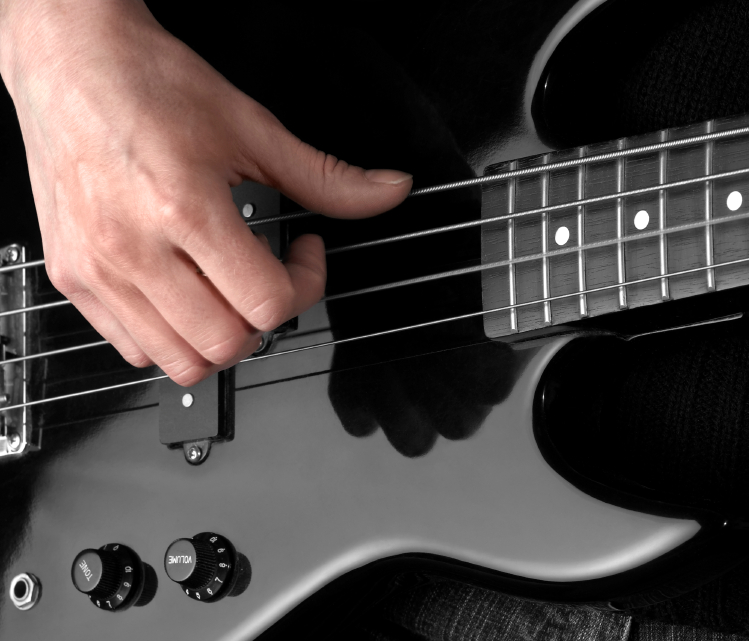- Home
- Products
- Sound Tech and PA
- Sound Tech DVDs & Downloads
- Free Tech Resources
- Free Sound Tech Lessons
- Playing By Ear
- Play By Ear DVDs & Downloads
- Ear Training & Music Theory Resources
- Worship Leading
- Worship Leading Course Downloads
- Free Worship Leader Training
- Free Worship Leader Resources
- Worship Band Skills
- Band Skills DVDs & Downloads
- DIY Worship Team Workshops
- Free Worship Team Training
- Free Worship Team Resources
-
- Lock to the kick drum.
If you are new to bass then the key that every experienced player will tell you is to start by locking your groove into the kick drum. - Think harmony.
Bass is actually a cross over between the rhythm section and the harmony. A really effective bassist will still lock to the kick but have a good grasp of the all notes in the chord being played, as well as some understanding of chord substitutions and passing notes they can use. These can all add harmony textures too. If you’re not familiar with chord theory then there’s plenty of it on our blog and our Intermediate bass course teaches you all you need to know. - Use inversions as well as root notes.
A great way to get started with harmony is to think about inversions. A basic chord uses the 1st 3rd and 5th notes of the scale the chord is derived from. So a G chord will have a G note or the 1st, a B note, the 3rd (G is 1, A is 2 and B is 3) and D is the 5th. So rather than just playing the root note you can play the 3rd (1st inversion) or the 5th (2nd inversion). Both give different textures and some work more appropriately than others so you need to experiment. Our beginners courses cover this in more detail. - Don’t play like a frustrated lead guitarist.
Many bass players who have transferred over from guitar can play the right notes but still think like a lead instrument rather than rhythm section. So a lot of bass players fill up way too many notes, partly because they have the dexterity to play faster than the music requires and because they get bored of the consistency and feel the need to express themselves. Bass is a team role just like drums. If that consistent underpinning of the song seems boring then you are probably playing the wrong instrument.
- Timing is everything.
Cool riffs played out of time sound so much worse than even simple phrases in time. Especially if you are into playing damped ghost notes. These are pointless unless they are really in time so practice with a metronome if necessary. - Taste is everything.
I hear so many bass players throwing random notes into their licks. Chord tones (notes from the chord being played) is often a great start to tasteful lines. - Tone is not everything, but it helps!
Great tone is not just about the amp and guitar but also to do with your sense of touch. Don’t just pluck notes in the same area of the string. Experiment with playing over the neck or next to the bridge. Volume and tone controls can make a big difference too. - Careful of the funk!
Most bass players go through their funk stage, but please don’t inflict it on the rest of the church unless you are a) in a black majority church that can actually play funk b) in a black majority church that can actually play funk.
- Lock to the kick drum.
8 tips for Christian bass players
Musicademy’s Worship Bass courses
Find out more about Musicademy’s worship bass courses. Beginners, Intermediate, Advanced courses plus The Worship Bass Collection and Song Learner series.
Available on DVD, as downloads or via our subscription site.
Previous posts in our series of advice for Christian musicians
Communication skills for worship teams
Other posts on bass you might find helpful:
Downloadable drum grooves for practice
Recommendations on bass guitar strings
Jesu Joy of Man’s Desiring bass score
Ask the Expert – Singing while playing bass


 Find out more about
Find out more about  Free Band Skills course with all Musicademy or Worship Backing Band DVD orders
Free Band Skills course with all Musicademy or Worship Backing Band DVD orders  Free gift with all Musicademy and Worship Backing Band DVD orders
Free gift with all Musicademy and Worship Backing Band DVD orders  Worship Training Day Ealing London 5 November 2022
Worship Training Day Ealing London 5 November 2022  How to get maximum exposure for your song writing
How to get maximum exposure for your song writing  Streaming online church services: the tech, the tips and the stories from around the world
Streaming online church services: the tech, the tips and the stories from around the world  What do you most struggle with as a worship musician?
What do you most struggle with as a worship musician?  Worship Leader Training: Beginning and Ending Songs Well
Worship Leader Training: Beginning and Ending Songs Well  Learn how to play by ear
Learn how to play by ear  4 tips for making good use of your mic
4 tips for making good use of your mic 

